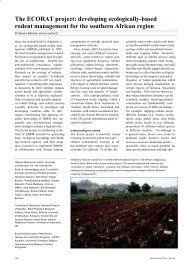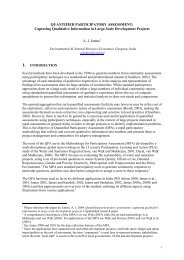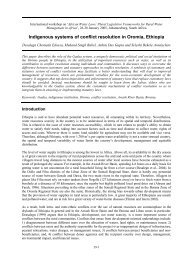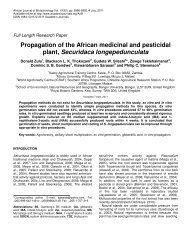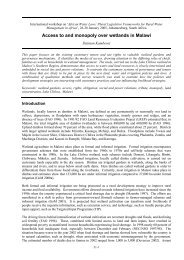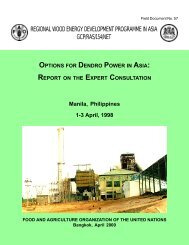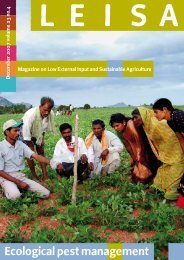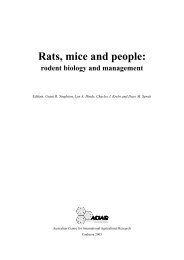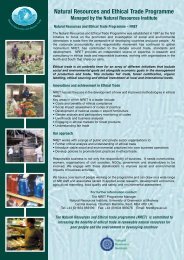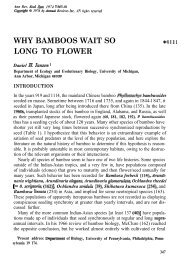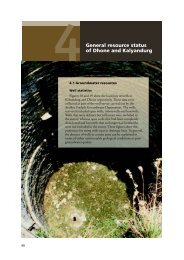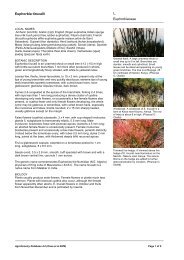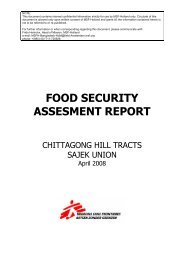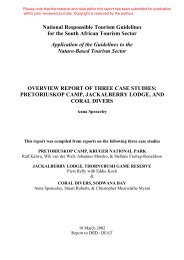Access to Rural Non-Farm Livelihoods - Natural Resources Institute
Access to Rural Non-Farm Livelihoods - Natural Resources Institute
Access to Rural Non-Farm Livelihoods - Natural Resources Institute
Create successful ePaper yourself
Turn your PDF publications into a flip-book with our unique Google optimized e-Paper software.
with other sources of funding already in place, the requirements for collateral, the high<br />
interest rates, short terms, and lack of grace periods, and the costs of travelling <strong>to</strong> Kyotera <strong>to</strong><br />
apply for credit and <strong>to</strong> make monthly repayments. The lack of a grace period in particular<br />
makes it difficult for borrowers with only one IGA, as often the IGA supported by the loan<br />
does not generate enough profit immediately <strong>to</strong> service it. Loans <strong>to</strong> agriculture are especially<br />
problematic, as no profit is realised until after the harvest, and delays in disbursement can<br />
render the loan useless. However, the conservative lending policies, high interest rates, and<br />
“diligence” in ensuring repayment have allowed the RRCS and the Kyotera CERUDEB<br />
branch <strong>to</strong> become financially self sustaining, albeit with relatively small margins, and the<br />
provision of credit <strong>to</strong> medium sized enterprises (in the local context) has been important in<br />
generating employment.<br />
The DWCS was established in response <strong>to</strong> the inability of the RRCS <strong>to</strong> provide appropriate<br />
credit <strong>to</strong> women and the poor. In 1995, Danida invited the Uganda Women’s Finance and<br />
Credit Trust (UWFCT) <strong>to</strong> join them as a partner, but after an initial appraisal, they declined<br />
due <strong>to</strong> the high costs of providing small loans in a sparsely populated rural area. At that point<br />
(1996) the then CAO suggested the Vic<strong>to</strong>ria Building Society (VBS), a small local institution<br />
formed in 1989 following the collapse of the Equa<strong>to</strong>r Building Society when the Kyotera<br />
branch’s business was reorganised under local management and refinanced from members’<br />
savings 37 . The VBS had earlier been involved with the disbursement of the Government’s<br />
Entandikwa and PAP funds, as well as its own funds, and a small amount of money provided<br />
by the President <strong>to</strong> the Rakai Women’s Association.<br />
However, the VBS has, and has had numerous institutional and administrative problems<br />
which have affected its performance and the running of the DWCS. Foremost among the<br />
concerns are its lack of legal status and failure <strong>to</strong> register as a financial institution, its poor<br />
record keeping, its weak financial position, lack of capacity on the part of its staff, and its<br />
failure <strong>to</strong> hold regular General Meetings, <strong>to</strong> provide dividends <strong>to</strong> its shareholders, and <strong>to</strong><br />
clarify the status of its board, as well as a negative report from the Bank of Uganda, and<br />
rumours of disbursement malpractice 38 .<br />
Some of these problems were known <strong>to</strong> Danida before the DWCS began, and in the initial<br />
design of the scheme there was considerable emphasis on institutional capacity building, with<br />
almost three times as much budgeted for the development of the VBS itself as for the loan<br />
fund. However, at almost exactly the same time as the first tranche of the loan fund was<br />
released, PriceWaterhouseCoopers released a highly critical report on the VBS which opined<br />
that its institutional failures were so severe as <strong>to</strong> make further investment unwise. The report<br />
was in turn criticised by the management of the VBS, but, unfortunately, it came at a time at<br />
which there was considerable turnover within Danida and the Danish Embassy, and the<br />
incoming staff, lacking institutional memory, had no option but <strong>to</strong> accept it at face value.<br />
Thus only the first disbursement of 30,000,000 shillings (~US$ 17,000) was made <strong>to</strong> the<br />
VBS, with subsequent disbursements and technical support frozen indefinitely.<br />
Despite the lack of further funding and much need technical support, the VBS went on <strong>to</strong><br />
loan out and rotate the fund, and implement the DWCS, aiming <strong>to</strong> loan <strong>to</strong> poor rural women<br />
without other access <strong>to</strong> credit in the hope of improving their and their households’ economic<br />
37 Many influential local politicians and civil servants sit on the board.<br />
38 For more on these various problems, see Bird et al., 2000.<br />
18



